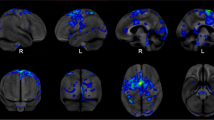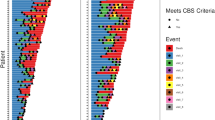Abstract
Background
Progressive apraxia of speech (PAOS) is a neurodegenerative disorder of speech programming distinct from aphasia and dysarthria, most commonly associated with a 4-repeat tauopathy. Our objective was to better understand the reasons for possible delays or diagnostic errors for patients with PAOS.
Methods
Seventy-seven consecutive PAOS research participants from the Neurodegenerative Research Group were included in this study. The medical records for these patients were reviewed in detail. For each speech-related visit, data such as the chief complaint, clinical findings, and neuroimaging findings were recorded.
Results
Apraxia of speech was the initial diagnosis in 20.1% of participants at first evaluation noted in the historical record. Other common diagnoses included primary progressive aphasia (PPA) (20.1%), dysarthria (18.18%), MCI/Dementia (6.5%), and motor neuron disease (3.9%). It took a median of 2.02 (range: 0.16–8.18) years from symptoms onset for participants to receive an initial diagnosis and 3.00 (range: 0.49–9.42) years to receive a correct diagnosis. Those who were seen by a speech-language pathologist (SLP) during their first documented encounter were more likely to be correctly diagnosed with PAOS (37/48) after SLP consultation than those who were not seen by an SLP on initial encounter (5/29) (p < 0.001).
Conclusion
Approximately 80% of patients with PAOS were imprecisely diagnosed at their first visit, with it taking a median of 3 years from symptom onset to receiving a diagnosis of PAOS. Being seen by a speech-language pathologist during the initial evaluation increased the likelihood of a correct apraxia of speech diagnosis.
Similar content being viewed by others
References
Botha H, Josephs KA (2019) Primary progressive aphasias and apraxia of speech. CONTINUUM Lifelong Learn Neurol 25(1):101–127. https://doi.org/10.1212/con.0000000000000699
Armstrong MJ, Litvan I, Lang AE, Bak TH, Bhatia KP, Borroni B, Boxer AL, Dickson DW, Grossman M, Hallett M, Josephs KA, Kertesz A, Lee SE, Miller BL, Reich SG, Riley DE, Tolosa E, Troster AI, Vidailhet M, Weiner WJ (2013) Criteria for the diagnosis of corticobasal degeneration. Neurology 80(5):496–503. https://doi.org/10.1212/wnl.0b013e31827f0fd1
Boxer AL, Yu J-T, Golbe LI, Litvan I, Lang AE, Höglinger GU (2017) Advances in progressive supranuclear palsy: new diagnostic criteria, biomarkers, and therapeutic approaches. Lancet Neurol 16(7):552–563. https://doi.org/10.1016/s1474-4422(17)30157-6
Gorno-Tempini ML, Hillis AE, Weintraub S, Kertesz A, Mendez M, Cappa SF, Ogar JM, Rohrer JD, Black S, Boeve BF, Manes F, Dronkers NF, Vandenberghe R, Rascovsky K, Patterson K, Miller BL, Knopman DS, Hodges JR, Mesulam MM, Grossman M (2011) Classification of primary progressive aphasia and its variants. Neurology 76(11):1006–1014. https://doi.org/10.1212/wnl.0b013e31821103e6
Höglinger GU, Respondek G, Stamelou M, Kurz C, Josephs KA, Lang AE, Mollenhauer B, Müller U, Nilsson C, Whitwell JL, Arzberger T, Englund E, Gelpi E, Giese A, Irwin DJ, Meissner WG, Pantelyat A, Rajput A, Van Swieten JC, Troakes C, Antonini A, Bhatia KP, Bordelon Y, Compta Y, Corvol J-C, Colosimo C, Dickson DW, Dodel R, Ferguson L, Grossman M, Kassubek J, Krismer F, Levin J, Lorenzl S, Morris HR, Nestor P, Oertel WH, Poewe W, Rabinovici G, Rowe JB, Schellenberg GD, Seppi K, Van Eimeren T, Wenning GK, Boxer AL, Golbe LI, Litvan I (2017) Clinical diagnosis of progressive supranuclear palsy: the movement disorder society criteria. Mov Disord 32(6):853–864. https://doi.org/10.1002/mds.26987
Mesulam M-M (2001) Primary progressive aphasia. Ann Neurol 49(4):425–432. https://doi.org/10.1002/ana.91
Tetzloff KA, Duffy JR, Clark HM, Utianski RL, Strand EA, Machulda MM, Botha H, Martin PR, Schwarz CG, Senjem ML, Reid RI, Gunter JL, Spychalla AJ, Knopman DS, Petersen RC, Jack CR, Lowe VJ, Josephs KA, Whitwell JL (2019) Progressive agrammatic aphasia without apraxia of speech as a distinct syndrome. Brain 142(8):2466–2482. https://doi.org/10.1093/brain/awz157
Josephs KA, Duffy JR, Strand EA, Machulda MM, Senjem ML, Lowe VJ, Jack CR, Whitwell JL (2013) Syndromes dominated by apraxia of speech show distinct characteristics from agrammatic PPA. Neurology 81(4):337–345. https://doi.org/10.1212/wnl.0b013e31829c5ed5
Botha H, Duffy JR, Whitwell JL, Strand EA, Machulda MM, Schwarz CG, Reid RI, Spychalla AJ, Senjem ML, Jones DT, Lowe V, Jack CR, Josephs KA (2015) Classification and clinicoradiologic features of primary progressive aphasia (PPA) and apraxia of speech. Cortex 69:220–236. https://doi.org/10.1016/j.cortex.2015.05.013
Duffy JR, Utianski RL, Josephs KA (2020) Primary progressive apraxia of speech: from recognition to diagnosis and care. Aphasiology. https://doi.org/10.1080/02687038.2020.1787732
Josephs KA, Duffy JR, Strand EA, Machulda MM, Senjem ML, Master AV, Lowe VJ, Jack CR, Whitwell JL (2012) Characterizing a neurodegenerative syndrome: primary progressive apraxia of speech. Brain 135(5):1522–1536. https://doi.org/10.1093/brain/aws032
Josephs KA, Duffy JR, Strand EA, Machulda MM, Senjem ML, Gunter JL, Schwarz CG, Reid RI, Spychalla AJ, Lowe VJ, Jack CR, Whitwell JL (2014) The evolution of primary progressive apraxia of speech. Brain 137(10):2783–2795. https://doi.org/10.1093/brain/awu223
Whitwell JL, Weigand SD, Duffy JR, Clark HM, Strand EA, Machulda MM, Spychalla AJ, Senjem ML, Jack CR, Josephs KA (2017) Predicting clinical decline in progressive agrammatic aphasia and apraxia of speech. Neurology 89(22):2271–2279. https://doi.org/10.1212/wnl.0000000000004685
Utianski RL, Duffy JR, Clark HM, Strand EA, Botha H, Schwarz CG, Machulda MM, Senjem ML, Spychalla AJ, Jack CR, Petersen RC, Lowe VJ, Whitwell JL, Josephs KA (2018) Prosodic and phonetic subtypes of primary progressive apraxia of speech. Brain Lang 184:54–65. https://doi.org/10.1016/j.bandl.2018.06.004
Whitwell JL, Duffy JR, Strand EA, Machulda MM, Tosakulwong N, Weigand SD, Senjem ML, Spychalla AJ, Gunter JL, Petersen RC, Jack CR, Josephs KA (2015) Sample size calculations for clinical trials targeting tauopathies: a new potential disease target. J Neurol 262(9):2064–2072. https://doi.org/10.1007/s00415-015-7821-5
Duffy JR, Josephs KA (2012) The diagnosis and understanding of apraxia of speech: why including neurodegenerative etiologies may be important. J Speech Lang Hear Res. https://doi.org/10.1044/1092-4388(2012/11-0309)
Botha H, Utianski RL, Whitwell JL, Duffy JR, Clark HM, Strand EA, Machulda MM, Tosakulwong N, Knopman DS, Petersen RC, Jack CR, Josephs KA, Jones DT (2018) Disrupted functional connectivity in primary progressive apraxia of speech. NeuroImage Clin 18:617–629. https://doi.org/10.1016/j.nicl.2018.02.036
Tetzloff KA, Utianski RL, Duffy JR, Clark HM, Strand EA, Josephs KA, Whitwell JL (2018) Quantitative analysis of agrammatism in agrammatic primary progressive aphasia and dominant apraxia of speech. J Speech Lang Hear Res 61(9):2337–2346. https://doi.org/10.1044/2018_jslhr-l-17-0474
Poole ML, Brodtmann A, Darby D, Vogel AP (2017) Motor speech phenotypes of frontotemporal dementia, primary progressive aphasia, and progressive apraxia of speech. J Speech Lang Hear Res 60(4):897–911. https://doi.org/10.1044/2016_JSLHR-S-16-0140
Respondek G, Compta Y (2020) Primary progressive apraxia of speech: a further piece in the progressive supranuclear/corticobasal degeneration spectrum jigsaw. Parkinsonism Relat Disord 81:219–220. https://doi.org/10.1016/j.parkreldis.2020.11.004
Takakura Y, Otsuki M, Sakai S, Tajima Y, Mito Y, Ogata A, Koshimizu S, Yoshino M, Uemori G, Takakura S, Nakagawa Y (2019) Sub-classification of apraxia of speech in patients with cerebrovascular and neurodegenerative diseases. Brain Cogn 130:1–10. https://doi.org/10.1016/j.bandc.2018.11.005
Knopman DS (1998) The initial recognition and diagnosis of dementia. Am J Med 104(4):2S-12S. https://doi.org/10.1016/s0002-9343(98)00022-9
Ducharme S, Dols A, Laforce R, Devenney E, Kumfor F, Van Den Stock J, Dallaire-Théroux C, Seelaar H, Gossink F, Vijverberg E, Huey E, Vandenbulcke M, Masellis M, Trieu C, Onyike C, Caramelli P, De Souza LC, Santillo A, Waldö ML, Landin-Romero R, Piguet O, Kelso W, Eratne D, Velakoulis D, Ikeda M, Perry D, Pressman P, Boeve B, Vandenberghe R, Mendez M, Azuar C, Levy R, Le Ber I, Baez S, Lerner A, Ellajosyula R, Pasquier F, Galimberti D, Scarpini E, Van Swieten J, Hornberger M, Rosen H, Hodges J, Diehl-Schmid J, Pijnenburg Y (2020) Recommendations to distinguish behavioural variant frontotemporal dementia from psychiatric disorders. Brain 143(6):1632–1650. https://doi.org/10.1093/brain/awaa018
Besser LM, Galvin JE (2020) Diagnostic experience reported by caregivers of patients with frontotemporal degeneration. Neurol Clin Pract 10(4):298–306. https://doi.org/10.1212/cpj.0000000000000738
Marshall CR, Hardy CJD, Volkmer A, Russell LL, Bond RL, Fletcher PD, Clark CN, Mummery CJ, Schott JM, Rossor MN, Fox NC, Crutch SJ, Rohrer JD, Warren JD (2018) Primary progressive aphasia: a clinical approach. J Neurol 265(6):1474–1490. https://doi.org/10.1007/s00415-018-8762-6
Magnin E, Démonet J-F, Wallon D, Dumurgier J, Troussière A-C, Jager A, Duron E, Gabelle A, De La Sayette V, Volpe-Gillot L, Tio G, Evain S, Boutoleau-Bretonnière C, Enderle A, Mouton-Liger F, Robert P, Hannequin D, Pasquier F, Hugon J, Paquet C (2016) Primary progressive aphasia in the network of French alzheimer plan memory centers. J Alzheimers Dis 54(4):1459–1471. https://doi.org/10.3233/jad-160536
Bergeron D, Gorno-Tempini ML, Rabinovici GD, Santos-Santos MA, Seeley W, Miller BL, Pijnenburg Y, Keulen MA, Groot C, Van Berckel BNM, Van Der Flier WM, Scheltens P, Rohrer JD, Warren JD, Schott JM, Fox NC, Sanchez-Valle R, Grau-Rivera O, Gelpi E, Seelaar H, Papma JM, Van Swieten JC, Hodges JR, Leyton CE, Piguet O, Rogalski EJ, Mesulam MM, Koric L, Nora K, Pariente J, Dickerson B, Mackenzie IR, Hsiung GYR, Belliard S, Irwin DJ, Wolk DA, Grossman M, Jones M, Harris J, Mann D, Snowden JS, Chrem-Mendez P, Calandri IL, Amengual AA, Miguet-Alfonsi C, Magnin E, Magnani G, Santangelo R, Deramecourt V, Pasquier F, Mattsson N, Nilsson C, Hansson O, Keith J, Masellis M, Black SE, Matías-Guiu JA, Cabrera-Martin MN, Paquet C, Dumurgier J, Teichmann M, Sarazin M, Bottlaender M, Dubois B, Rowe CC, Villemagne VL, Vandenberghe R, Granadillo E, Teng E, Mendez M, Meyer PT, Frings L, Lleó A, Blesa R, Fortea J, Seo SW, Diehl-Schmid J, Grimmer T, Frederiksen KS, Sánchez-Juan P, Chételat G, Jansen W, Bouchard RW, Laforce RJ, Visser PJ, Ossenkoppele R (2018) Prevalence of amyloid-β pathology in distinct variants of primary progressive aphasia. Ann Neurol 84(5):729–740. https://doi.org/10.1002/ana.25333
Grossman M (2010) Primary progressive aphasia: clinicopathological correlations. Nat Rev Neurol 6(2):88–97. https://doi.org/10.1038/nrneurol.2009.216
Henry ML, Grasso SM (2018) Assessment of individuals with primary progressive aphasia. Semin Speech Lang 39(3):231–241. https://doi.org/10.1055/s-0038-1660782
Mumby K, Bowen A, Hesketh A (2007) Apraxia of speech: how reliable are speech and language therapists’ diagnoses? Clin Rehabil 21(8):760–767. https://doi.org/10.1177/0269215507077285
Tierney CD, Pitterle K, Kurtz M, Nakhla M, Todorow C (2016) Bridging the gap between speech and language: using multimodal treatment in a child with apraxia. Pediatrics 138(3):e20160007–e20162016. https://doi.org/10.1542/peds.2016-0007
Tetzloff KA, Duffy JR, Strand EA, Machulda MM, Boland SM, Utianski RL, Botha H, Senjem ML, Schwarz CG, Josephs KA, Whitwell JL (2018) Clinical and imaging progression over 10 years in a patient with primary progressive apraxia of speech and autopsy-confirmed corticobasal degeneration. Neurocase 24(2):111–120. https://doi.org/10.1080/13554794.2018.1477963
Utianski RL, Duffy JR, Clark HM, Strand EA, Boland SM, Machulda MM, Whitwell JL, Josephs KA (2018) Clinical progression in four cases of primary progressive apraxia of speech. Am J Speech Lang Pathol 27(4):1303–1318. https://doi.org/10.1044/2018_ajslp-17-0227
Duffy J (2019) Motor speech disorders, 4th edn. Elsevier, Amsterdam
Utianski RL (2020) Primary progressive aphasia and other frontotemporal dementias: diagnosis and treatment of associated communication disorders. Plural Publishing, San Diego
Acknowledgements
Funding was provided by Foundation for the National Institutes of Health (Grant Nos. R01-DC12519, R01-DC010367, R01-DC14942, R01-NS89757).
Author information
Authors and Affiliations
Corresponding author
Ethics declarations
Conflicts of interest
The authors have no relevant financial or non-financial interests to disclose.
Rights and permissions
About this article
Cite this article
Dang, J., Graff-Radford, J., Duffy, J.R. et al. Progressive apraxia of speech: delays to diagnosis and rates of alternative diagnoses. J Neurol 268, 4752–4758 (2021). https://doi.org/10.1007/s00415-021-10585-8
Received:
Revised:
Accepted:
Published:
Issue Date:
DOI: https://doi.org/10.1007/s00415-021-10585-8




